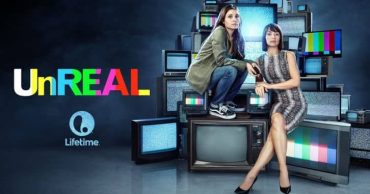
Would it be too dark to say that this week’s episode of UnREAL took a dramatic leap of faith? Bad pun aside, “Fly” is by far UnREAL‘s most dramatic hour, an episode that truly throws the show off the rails of reality and into the ‘unreal’ world suggested by the title. However, “Fly” and its climatic moment could be a turning point for some of the show’s (small, but dedicated) audience: has UnREAL gone too far?
There’s merit to both sides of the argument; while “Fly” works wonderfully in the context of the show’s dark satire of Hollywood and reality television, it works outside of the logic used in the first five episodes. The fact Rachel is so quick to jump on board with the idea of bringing on Mary’s ex-husband Kirk is a little unnerving, considering how carefully she’s manipulated the other women playing this game before. Sure, she’s certainly proven herself capable of doing despicable things, but immediately jumping on board with the idea of bringing the abusive Kirk on set even seems a little far for Rachel, or even Quinn for that matter (who provides the episode’s most cringe-worthy moment, when she panics about having no cameras watching Mary on the roof).
Whether this particular bit of story works comes down to two factors. First of all, can you believe these people can be so ugly, and yet still have redemptive qualities? So far, UnREAL has pushed our limits of empathy with both Rachel and Quinn, with only the laughably outlandish Shia serving as a barometer of their own horrible behavior. Even Chet’s attempt to mess up the bet between him and Quinn feels innocuous next to the stunts these two try to coordinate in the episode; weirdly enough, it’s mostly Shia who is posited as the woman to blame, since she messed with Mary’s medication and invited her to drink while on the set. This is a hard fact to reconcile; and considering how important it is to the crux of “Fly” and its story, this can make the events of the episode’s last ten minutes a little difficult to watch.
The second component is more a broad question about UnREAL: how far can they warp and twist reality until it has become meaningless? There is little in the way of empathy in the world of UnREAL, and its exaggerated, focused attempts to criticize reality television and the culture surrounding it place it in a heightened reality all its own. UnREAL can be very blunt about making its point, and the ending to “Fly” is no different; it is designed to shock, to force the audience to consider the mental and emotional ramifications of producers manipulating the lives of its contestants for dramatic satisfaction. While UnREAL exists in its own world, editing its show basically in real-time and never consistently portraying the actual progression of the show (there are six girls left already?) to the viewing audience, it does so to make sharp observations about human psychology, particularly the idea of love and how it can corrupt our minds. Sometimes, this comes in the face of very brash moments or actions (remember “This is what a feminist looks like?”). Mary’s death is but another one of those, one that comes with a number of broader complications for the show.
The real question is: does it work? Is it ‘too far’? Can we believe that this would happen, and Everlasting would continue to go on? The truth is, we don’t know where Everlasting (or UnREAL) is headed after this world-breaking event. However, given the other events of the episode – particularly the odd scene with the successful pitch for next season by Quinn and Chet – it seems that this on-set may be the end of Everlasting; like Jeremy’s engagement, UnREAL and Everlasting both are in the market of teasing the audience with happiness, then pulling the much-deserved rug out from underneath them. In other words, there’s no way to judge that in the moment; and although it comes with some pretty obvious character machinations to make it work, I think Mary’s suicide is a devastating, eye-opening moment UnREAL can build on.
To this point, UnREAL has been able to pique our interest in the psychology of making a reality show and the moral compromises that come with trying to make ‘good’ television. But UnREAL has also shied away from black-and-white definitions of its main characters; the first thirty minutes of “Fly” continue to show that, be it the conflicted feelings of Jeremy or Quinn, or Anna’s very-familiar speech of “not feeling like myself” when the cameras are around. In that light, UnREAL‘s climatic moment this week is a challenge to the audience, to force us to contemplate whether these producers are decent, flawed people in mutually-destructive relationships with their contestants, or manipulative dirt bags with no redemptive qualities, running around and tearing through people’s lives like a cash-chasing Godzilla.
I’m guessing that UnREAL hopes we’ll fall somewhere in the middle, but I wonder if the end of “Fly” is too drastic (and telegraphed) a moment to do that. Watching the episode, it’s obvious to see the pieces falling into place; once the sister shows up and starts giving worried looks, it’s pretty clear what the title of the episode is referencing. That realization is built into the episode, designed as a slow-moving train wreck we’re forced to watch, Clockwork Orange-style; and while I think the execution of this story is definitely flawed, I’m no less interested in seeing where unREAL goes from here than I was before Mary took her fateful plunge.
Other thoughts/observations:
– There was a Dark Angel reunion of sorts this week, though not in the same scene: Mary is played by Ashley Scott (who played Asha on Angel), and network executive Brad is portrayed by Martin Cummins, who played Ames White in Angel‘s second season.
– The scenes with Kirk are also a little forced, particularly when Mary goes into the room where he’s restrained, and he chides her for being unstable – though never having been on either side of a relationship like that, I can’t say this is not how conversations like that would play out.
– Quinn, reinforcing her ability to pitch to the network: “Don’t tell me how to tickle balls – I know how to tickle balls.”
– Shia is officially the worst – and also the most disappointing part of UnREAL, less a counterpart to Rachel then a crazy woman who does absolutely the dumbest, most short-sighted thing possible at every turn.
[Photo via Lifetime]
 Follow Us
Follow Us





